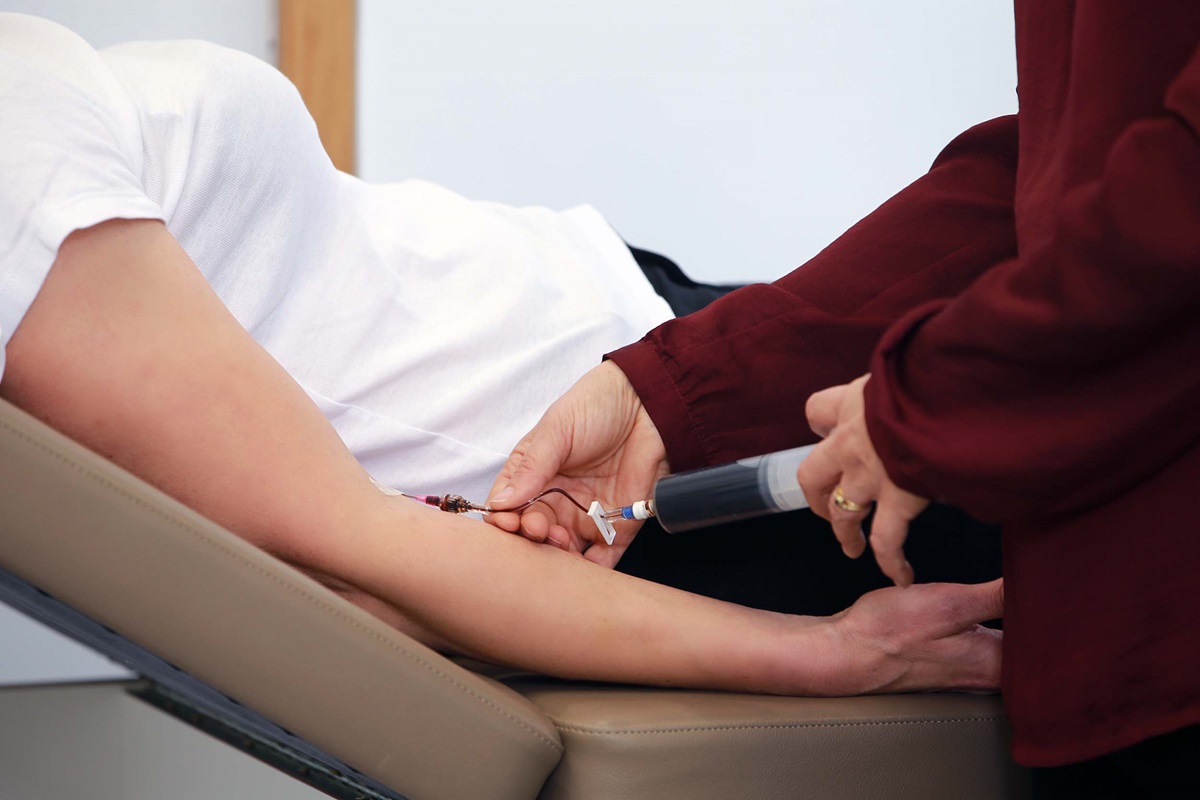Iron IV Infusion
Enhance your health and quality of life.



Iron deficiency is a widespread nutritional disorder that significantly impacts health by impairing the body’s ability to transport oxygen.
Iron IV infusions provide a fast and effective solution for symptoms associated with anemia or related health issues. However, it is important to follow up with a healthcare providers for appropriate treatment and dosage..
At Tadawi Medical Center, we offer iron therapy for iron deficiency under the supervision of a team of elite doctors and specialists.
What is IV iron given for?
Iron IV infusions are given when there is not enough iron in the blood to produce red blood cells, this is diagnosed with an iron blood test. It is used for:
- Iron-Deficiency Anemia: When iron levels are too low to produce sufficient healthy red blood cells, leading to fatigue, weakness, and other symptoms.
- Chronic Kidney Disease (CKD): Patients with CKD often need iron iv infusions to help maintain adequate haemoglobin levels.
- Inflammatory Bowel Disease (IBD): In conditions like Crohn’s disease or ulcerative colitis, intravenous iron is used when the intestines can’t absorb oral iron properly.
- Pregnancy-Related Anemia: In severe iron deficiency during pregnancy, iron IV infusion is sometimes required to rapidly restore iron levels.
- Blood Loss: Significant blood loss from surgery, trauma, or heavy menstruation may require intravenous iron to quickly replenish iron stores.
- Cancer Patients: Those undergoing chemotherapy may require an iron IV infusion, as treatments can affect red blood cell production.
How serious is an iron infusion / Side effect of Iron Infusion?
An iron infusion is generally considered safe, but like any medical procedure, there are potential risks and side effects.
Iron therapy side effects are:
- Temporary side effects but unusual: iron therapy side effects may include:
– Headache
– Nausea or vomiting
– Chest pain or shortness of breath
– Pain or swelling at the injection site - Allergic Reactions: Rarely, serious allergic reactions can occur. This is why infusions are usually done under medical supervision, where emergency care can be provided if needed.
- Iron Overload: Too frequent infusions or too high a dosage can lead to iron overload, which can damage organs like the liver or heart, though this is rare with carefully monitored doses.
How quickly do iron infusions increase hemoglobin?
Intravenous iron can increase hemoglobin levels relatively quickly compared to oral iron supplements. After an iron infusion, hemoglobin levels typically begin to rise within a few days, but the exact timing can vary depending on several factors, including:
- Severity of the iron deficiency: The more severe the anemia, the longer it may take to see a significant rise.
- Underlying health conditions: Chronic diseases or absorption issues can affect how quickly the body responds.
- Amount of iron given: Some protocols require multiple infusions, while others provide a large single dose.
When do you need an iron infusion?
An iron IV infusion may be needed in several specific situations related to iron deficiency or anemia. Here are some:
- Iron therapy for iron deficiency anemia: When hemoglobin levels are significantly low (often below 7-8 g/dL) and causing symptoms like fatigue, weakness, or shortness of breath.
- Ineffective oral iron supplements: If a patient has tried oral iron supplements but hasn’t seen improvement in hemoglobin levels or his body is unable to absorb iron from diet.
- Chronic illnesses: Certain chronic illnesses, such as inflammatory bowel disease or celiac disease, can interfere with iron absorption and may require iron IV infusion.
- Increased Iron Needs: Situations where the body’s demand for iron is higher, such as pregnancy and rapid growth phases (in children and adolescents).
- Preoperative Preparation: For some patients, especially those with existing anemia, iron infusions may be given prior to surgery to boost hemoglobin levels and improve outcomes.
What are the benefits after iron infusion?
Iron IV infusion can provide significant benefits for individuals with iron deficiency anemia. Here are some of the key iron IV infusion benefits:
- Increased Energy Levels: Iron IV infusions can quickly increase hemoglobin levels, which is essential for carrying oxygen throughout the body.
- Reduced Symptoms: Symptoms like weakness, dizziness, shortness of breath, and pale skin often diminish or resolve altogether as iron levels normalize.
- Improved Quality of Life: Intravenous iron can enhance overall well-being and quality of life, allowing them to engage more fully in social and recreational activities.
- Faster Recovery: Patients may notice a quicker recovery from illness or surgery due to improved iron levels supporting overall health and immune function.
How much does an IV iron injection cost?
The iron infusion price can vary widely based on several factors, including:
- The healthcare provider: Costs may differ between hospitals, clinics, and private practices and any associated lab tests or monitoring required before or after the fe infusion.
- Insurance Coverage: Many insurance plans cover the cost of intravenous iron, but co-pays and deductibles will affect the out-of-pocket cost for the patient.
- The amount of iron administered: The cost may increase with higher doses and types of iron infusions.
At Tadawi Medical Center an Iron IV costs starting at 500 QR.
How long does an iron infusion take?
An IV iron infusion can take 15 to 30 minutes. You can get a typical dose of 1,000 milligrams of iron in that time.
If you are considering intravenous iron therapy, it is advisable to contact your healthcare provider or insurance company for a more accurate cost estimate.
The team at Tadawi Medical Center can provide you with information about your condition and help you determine the best course of treatment.
BOOK NOW